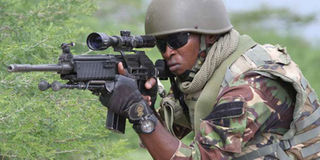African Union troops to start pulling out of Somalia in 2018

Kenya Defence forces under Africa Union Mission in Somalia (Amisom) soldier takes an aim during patrol Afmadow town on November 22, 2015. African forces in Somalia should start withdrawing from October 2018, the African Union has said. PHOTO | JEFF ANGOTE | NATION MEDIA GROUP
What you need to know:
- Amisom should start pulling out of Somalia only after a new stable government has been in place.
- AU is banking on an upcoming election in Somalia in early September for this schedule to work.
- Kenya and Uganda threatened to withdraw their troops citing frustrations with the international community that is supposed to finance mission.
African forces in Somalia, of which the Kenya Defence Forces are a part, should start withdrawing from October 2018, the African Union has said.
The African Peace and Security Council said the two-year period would allow proper establishment of necessary facilities for the handover of African Union Mission (Amisom) to the Somali forces.
The details of the two-year schedule were contained in a revised Concept of Operations (Conops) which the council approved last week during its 608th meeting in Addis Ababa, Ethiopia.
It means Amisom should start pulling out of Somalia only after a new stable government has been in place, Al-Shabaab has been chased out of most of the territory they still occupy and the Somali National Security Forces (SNSF) have been strengthened.
“The council endorses the revised Conops, which reflect efforts toward enhancing Amisom and SNSF operations and crucially identifies indicative timelines for an exit strategy of Amisom from Somalia,” the council said in a dispatch.
The Conops refers to a document that describes the mandate of the AU mission which was initially formed in 2007 to stabilise the then Somali Transitional Federal government as well as combat violent extremists.
It was revised following complaints from some troop contributing countries like Kenya that it lacked a clear coordination provision and that it did not indicate an exit strategy.
“The council takes note of the indicative timelines of Amisom exit strategy presented by the AU commission, which prioritises territorial recovery and consolidation by Amisom and SNSF until October 2018, and a subsequent draw down and transfer of security responsibilities to the SNSF from 2018 to December 2020,” said the council.
AU is banking on an upcoming election in Somalia in early September for this schedule to work and is calling on donors to help strengthen the Somali National Army to take over from Amisom.
The revelation came as both Kenya and Uganda, which contribute troops to Amisom, threatened to withdraw them, citing frustrations with the international community that is supposed to finance mission.
ADDITIONAL COMBAT PLANES
For example, Kenya, Uganda and Ethiopia had agreed to send additional aerial combat planes to the mission. But this depended on an agreement with the United Nations and the issuance of authorisation documents known on how to recompense this logistics. The negotiations have taken over a year.
Last week, it was revealed that the troops have not been receiving their monthly allowances because the European Union which finances the mission had not disbursed the money since January. In fact for Burundi, the EU said it would be pegging payment to the political situation in the country.
The AU Council in its latest decision says all troop and police contributing countries (T/PCC) to Amisom should “work in a collective, concerted and coordinated manner within the indicative time frame.”
The AU wants to lead any international programmes meant for Somalia for better coordination. But it decried the EU decision on Burundi saying it will affect morale.
“The Council further expresses deep concern about the recent decision by the EU to alter the payment procedures for the Burundian National Defence Force (BNDF) contingent within AMISOM, bearing in mind the critical phase of AMISOM operations especially in light of the upcoming elections in Somalia,” the dispatch added.
“Accordingly, Council urges the EU to reverse or at least delay the implementation of this decision in order to avoid possible adverse effects that could undermine AMISOM’s operational momentum.
The working of the revised CONOPS will depend on whether troop contributors and the UN Security Council agree with it. In endorsing to document, the African Union also asked the UN Security Council to lift an arms embargo it imposed on Somalia until November 2016.
The UN Council argued in March that the extended embargo was meant to stop al-Shabaab from gaining arms. But the African Union says lifting the ban will be a “critical aspect of building capable Somalia security institutions.”





